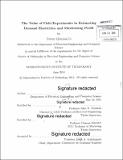The value of field experiments in estimating demand elasticities and maximizing profit
Author(s)
Li, Qiuyuan Jimmy
DownloadFull printable version (6.594Mb)
Other Contributors
Massachusetts Institute of Technology. Department of Electrical Engineering and Computer Science.
Advisor
John N. Tsitsiklis and Duncan Simester.
Terms of use
Metadata
Show full item recordAbstract
In many situations, the capabilities of firms are better suited to conducting and analyzing field experiments than to analyzing sophisticated demand models. However, the practical value of using field experiments to optimize marketing decisions remains relatively unstudied. We investigate category pricing decisions that require estimating a large matrix of cross-product demand elasticities and ask: how many experiments are required as the number of products in the category grows? Our main result demonstrates that if the categories have a favorable structure, then we can learn faster and reduce the number of experiments that are required: the number of experiments required may grow just logarithmically with the number of products. These findings potentially have important implications for the application of field experiments. Firms may be able to obtain meaningful estimates using a practically feasible number of experiments, even in categories with a large number of products. We also provide a relatively simple mechanism that firms can use to evaluate whether a category has a structure that makes it feasible to use field experiments to set prices. We illustrate how to accomplish this using either a sample of historical data or a pilot set of experiments. Historical data often suffer from the problem of endogeneity bias, but we show that our estimation method is robust to the presence of endogeneity. Besides estimating demand elasticities, firms are also interested in using these elasticities to choose an optimal set of prices in order to maximize profits. We formulate the profit maximization problem and demonstrate that substantial profit gains can also be achieved using a relatively small number of experiments. In addition, we discuss how to evaluate whether field experiments can help optimize other marketing decisions, such as selecting which products to advertise or promote. We adapt our models and methodologies to this setting and show that the main result that relatively few experiments are needed to estimate elasticities and to increase profits continues to hold.
Description
Thesis: Ph. D., Massachusetts Institute of Technology, Department of Electrical Engineering and Computer Science, 2014. Cataloged from PDF version of thesis. Includes bibliographical references (pages 99-101).
Date issued
2014Department
Massachusetts Institute of Technology. Department of Electrical Engineering and Computer SciencePublisher
Massachusetts Institute of Technology
Keywords
Electrical Engineering and Computer Science.